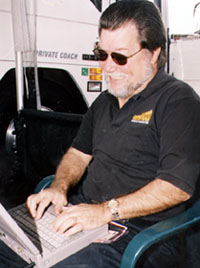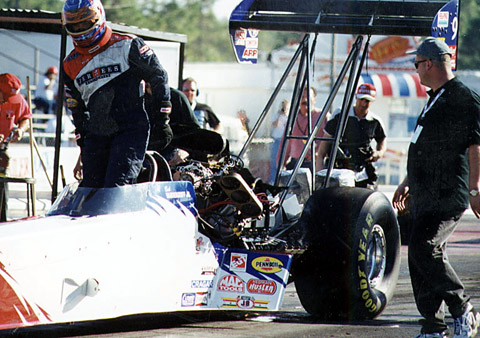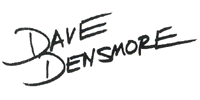| | | |||
 | ||||
|
Under new rules imposed by the High Sheriffs at the NHRA, Del gets body slammed with a $1,000 fine. Right? And with the loss of 10 competition points. Right? Plus he loses the choice of lanes in the semifinal. Right? Well, maybe not. Say that his semifinal opponent is John Force and say, just for argument, that in the preceding round, Force, too, suffered a mechanical failure in his Castrol GTX Ford, a failure that, as with Worsham, forced the NHRA to roll the Safety Safari trucks. Fine, loss of points and surrender of lane choice. Right? Hmmm. Obviously, in a battle of two sinners, one has to be deemed a little more sinful. So, who gets lane choice? That's one of a myriad of unanswered questions facing the NHRA as drag racing moves into the new millennium. There are, in fact, more questions than there are answers. Do you award lane choice to the driver whose oildown required the fewest bags of grease sweep? Or, as has often been the case, do you award it to a favorite driver. Or, do you give it to the Winston Champion, regardless of the severity of the infraction? Or to the sponsored driver over the unsponsored one? It's a judgment call left to those whose judgment has been subject to question ever since Steve Gibbs was shuffled off to the sidelines. Not that something doesn't need to be done about the catastrophic oildowns which have interrupted competition for as much as an hour, frustrating racers, sponsors, fans and officials - not to mention television crews. But it's difficult to believe that this is the best solution - penalizing racers for pushing the envelope. Can you picture NASCAR telling its racers, "we aren't imposing any new rules, but if you run faster than 200, we're going to fine you and take some points away?" Yeah, right! In drag racing though, the penalty flag apparently will be thrown every time the Safety Safari trucks are summoned from their static positions. So, even if the problem is beyond the control of the driver or Crew Chief (say it's the unexpected failure of an out-of-the-box part), the team responsible is going to be punished.
Obviously, the incentive to roll to the starting line for EVERY qualifying session, something most NHRA racers for years have done as a matter of course, is going to be minimal. Say you're a Top Fuel driver who's in the show after the first session with a representative time, why would you want to make three more attempts and risk incurring $1,500 in fines and loss of as many as 15 Winston points? Under such circumstances, the chance to gather more data would almost certainly be offset by the threat of penalties that may not only effect one's pocket book but also the quest for a championship. On a really bad weekend, a driver could make the show on four qualifying runs, lose in the first round and wind up with a total of one point (10 participation points and 20 first round loser points plus one point as a 13 through 16 qualifier LESS five points lost on each of four oildowns during qualifying and 10 points lost in the first round). That's 31 Winston points gained minus 30 surrendered in penalties. And barely enough money to pay the nitro bill. On the other hand, I could bring a slug to the track, back the engine down for one obligatory qualifying run and still leave with 10 participation points. Oh, the sponsored cars still will show up - at least those with the big budgets. But what about the little guys? No way. And what about the "Catch 22?" What about the rule which stipulates that the NHRA can impose additional penalties for those guilty of frequent violations? Who determines what is "frequent?" That simply looks like a rule that invites abuse. What's the solution? Don't ask me. I don't even know the firing order. What I do know is that the NHRA is taking the easy way out on this deal. The High Sheriffs are throwing the ball back into the racers' court, asking the competitors to police themselves. That's a concept that never has worked. There's absolutely no reason to believe this time will be any different.
Photos by Jeff Burk and Steve Gruenwald
| ||||
|
Copyright 1999-2001, Drag Racing Online and Racing Net Source | ||||
 For grins, let's say Del Worsham drives his Checkers/Schucks/Kragen Pontiac to victory in the second round of the season-opening AutoZone Winternationals at the LA County Fairplex, but, en route, his Funny Car hangs a valve, burns a piston, and oils down the racetrack.
For grins, let's say Del Worsham drives his Checkers/Schucks/Kragen Pontiac to victory in the second round of the season-opening AutoZone Winternationals at the LA County Fairplex, but, en route, his Funny Car hangs a valve, burns a piston, and oils down the racetrack. 
